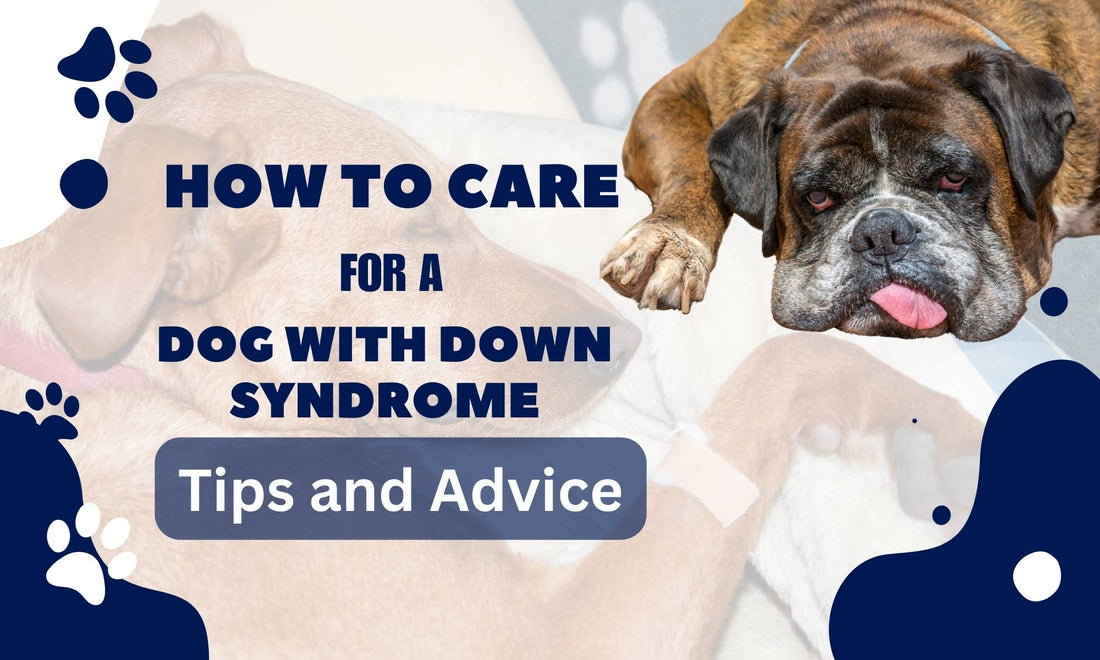We understand that many pet owners may be concerned about whether their dogs can have Down syndrome, which is a genetic disorder that affects humans. While dogs cannot have Down syndrome in the same way humans do, they can still experience genetic disorders that can affect their development and health.
What is Down Syndrome?
To evaluate if dogs can have Down syndrome, it is necessary to first grasp what this disorder includes. The National Down Syndrome Society states:
"Within each cell of the human body is a nucleus that stores genetic material in genes. These genes contain codes for all inherited traits and exist on rod-like structures called chromosomes. Typically, every cell nucleus has 23 pairs of chromosomes, one half from each parent. However, individuals with Down syndrome possess either an additional full or partial copy of chromosome 21."
Traits Associated With Down Syndrome
Down syndrome is associated with a variety of traits resulting from the presence of additional genetic material. Intellectual impairment can be present in individuals with Down syndrome, though the severity of this varies and tends to be mild or moderate.
The US Centers for Disease Control and Prevention (CDC) note that there are several common physical features often seen in those with Down syndrome, such as poor muscle tone and a line across the palm known as the palmar crease. However, it's important to note that while these traits may occur frequently among people with Down syndrome, they aren't universal; children and adults with this condition have individual differences just like other family members would. The Global Down Syndrome Society emphasizes this point by stating that, despite some shared characteristics within families affected by Down syndrome, each person looks more like their immediate relatives than anyone else who has the condition.
Can Dogs Have Down Syndrome?
The question of whether animals can have Down syndrome doesn't have a straightforward answer. There is speculation that some species, such as apes, tigers, and dogs, may develop clusters of genetic defects resembling this condition. While some veterinarians claim that dogs can indeed experience Down syndrome-like symptoms, it's not the same as what humans with the condition go through.
Dogs' chromosomes differ from those in people; they possess 78 pairs compared to our 46, and their canine equivalent of the human 21st chromosome has different information than ours does. Therefore, trisomy 21 wouldn't lead to Down syndrome in these animals.
However, many genes present on the human 21st pair are found elsewhere within other animal genomes, like a dog's. Unfortunately, research into dog genetics isn't nearly advanced enough yet for a comprehensive analysis of individual chromosomes or genes.
In cases where puppies do survive with similar symptoms to those seen in humans with Down syndrome (which typically don't appear until one or two years old), they may exhibit physical abnormalities and mental slowness early on while experiencing poor organ development without directly affecting survival rates.
Additionally, puppies born with this disorder often face challenges feeding themselves or moving around independently, which coupled with neglect from their mother, tragically leads to high mortality rates due to complications during the birth trauma experienced by these vulnerable pups. Dogs with Down syndrome tend to live only five years on average compared to healthy ones, who could reach ten- to fifteen-year lifespans.
Does Your Dog Have Down Syndrome?
Have you noticed any unusual symptoms in your beloved dog? If so, it's worth discussing with your veterinarian whether or not Down syndrome could be a possibility. While testing for this condition isn't straightforward due to the complexity of canine genetics, there are some signs that may indicate its presence.
These can include congenital heart disease, difficulty hearing (not reacting as quickly as other dogs), poor eyesight and cataracts, thyroid problems causing impaired metabolism and an unstable body temperature, odd behavior such as wailing from malformed internal organs, or unexplained reserve towards others. Additionally, physical characteristics like a warm and dry nose, unusual skin patches, frequent hair loss, or deformities in legs, hips, or facial features like a broad nose and protruding tongue may also suggest this condition.
Even if your vet is unable to offer a definitive diagnosis of Down syndrome in your pet—which can be challenging given the lack of clear-cut tests available—they may still recommend special attention and care tailored specifically for these unique animals based on their genetic makeup or embryonic development issues beyond our control.
Conditions that Look Like Down Syndrome in Dogs
Dogs, just like humans, can suffer from developmental conditions that bear similarities to Down syndrome. These ailments are regularly diagnosed in our cuddly companions.
One common example of such a condition is congenital hypothyroidism, which occurs when newborn dogs have low or no thyroid hormone levels at birth and during their formative years. Symptoms include stunted growth leading to smaller stature, large tongue protrusion, short limbs, and weak muscle tone, as well as delayed eye and ear development and cognitive delays.
There are several other medical conditions that may be confused with Down syndrome among dogs, such as pituitary dwarfism, congenital hydrocephalus, and portosystemic shunt. If any of these issues concern you about your dog's health status, it is best to see a veterinarian, who will help diagnose the problem before providing treatment recommendations based on their findings.
Preventing Genetic Disorders in Dogs
As a pet owner, it's important to be aware of genetic disorders that can affect your furry friend. Although there may not be any way to completely prevent them, steps can still be taken to reduce the risk.
Firstly, when choosing a breeder for your dog, make sure they perform thorough genetic testing on their breeding dogs. A reputable breeder will test for any known conditions in the breed and ensure they are only breeding healthy animals.
Secondly, maintaining good overall health through proper nutrition and regular exercise is key. This helps strengthen their immune system and reduces the likelihood of some diseases manifesting or worsening.
Lastly, but just as essential, never miss routine veterinary checkups! They help detect signs early on before an issue becomes too severe; this includes vaccinating them against infections at recommended intervals too."
Taking Care of a Dog With Down Syndrome
Taking care of a dog with Down syndrome can be challenging yet rewarding. However, it is crucial to consider that the expenses for caring for these dogs are relatively high.
These expenses come from the need to consult your veterinarian more often and incur higher costs due to frequent examinations, prescriptions, and testing. Sometimes medication may not even be available or may cause an allergic reaction in certain cases. Replacement costs related to furniture and carpeting also add up if you have a furry friend who occasionally chews on them, increasing difficulties in housekeeping that need extra attention.
Below are some tips on how to best navigate living with a dog with Down syndrome:
Remove possible obstacles: Since visually impaired dogs could bump into walls or objects around your home causing injury - dedicate sufficient space and install gates (dog/baby) especially where stairs lead horizontally. Place non-slip socks on him so he doesn't slip while moving about his routine. Naturally adapted equipment, such as wheelchairs, provides mobility options if needed.
Maintain good hygiene: sanitation is key; Expect frequent indoor accidents since bladder control can decrease over time; hence, having doggy diapers readily available to prevent any potential messes is recommended. Constant cleaning or regular diaper changes must take place afterwards. With periodic exposure, bloody discharge needs immediate inspection.
Eliminate Clutter: Your new family member might feel threatened at first; this increases anxiety levels, making household disorder precariously tempting to easily tear things apart. Items like comfortable bedding for security purposes instead of toys would serve better under these circumstances.
Assist when Necessary: The puppy's growth process requires constant supervision, especially helping find meals during meal times, lifting (with slings), supporting disorientated movement, etc.
By bearing these tips in mind, caring for a pet with Down syndrome becomes less stressful and more manageable.
Treatment and Management to Improve Your Dog's Quality of Life
As a pet owner, it can be heartbreaking to discover that your precious furry friend has Down syndrome. Unfortunately, there is still no cure for this condition in dogs. However, with proper treatment and management techniques recommended by veterinarians, you can significantly improve the quality of life for your dog.
One crucial aspect of managing Down syndrome in dogs is ensuring they have a balanced diet and live a healthy lifestyle. With patience and consistency, dogs with this disorder can still lead relatively normal lives. High-protein foods such as meat jerkies or mashed beef are excellent choices as they help strengthen muscles and increase energy levels.
If your dog experiences loss of appetite due to their disability or medication side effects, don't despair! You can use dried herbs like peppermint or ginger as an appetite stimulant; garlic powder works too since most dogs love it mixed with boiled chicken or turkey. Regular exercise is vital for preventing heart disease and strengthening muscles, but make sure you speak to a veterinarian first before establishing their exercise routine.
Additionally, socializing them with other pets and children helps keep them active while also reducing stress levels; these sweet pups tend to get along well with everyone! Finally, don't forget about regular check-ins at the vet clinic so medical professionals can evaluate treatment effectiveness properly; sometimes surgery may need consideration depending on the severity of your beloved pup's condition."
Conclusion
While dogs cannot have Down syndrome in the same way humans do, they can still experience genetic disorders that can affect their development and health. If you suspect that your dog may be experiencing a genetic disorder, it is essential to consult with a veterinarian. Additionally, pet owners can take steps to reduce the risk of their dog developing a genetic disorder, such as choosing a reputable breeder and providing their dog with proper care and veterinary attention.



